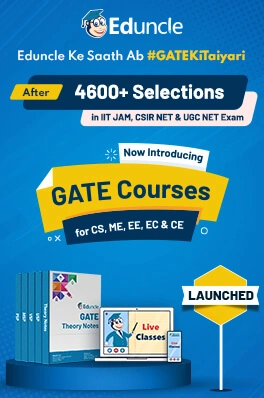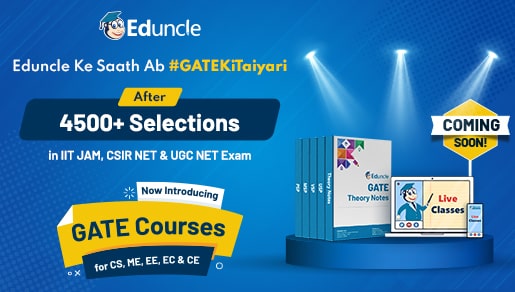Time management is very much important in IIT JAM. The eduncle test series for IIT JAM Mathematical Statistics helped me a lot in this portion. I am very thankful to the test series I bought from eduncle.
Nilanjan Bhowmick AIR 3, CSIR NET (Earth Science)Posts by Akash Bhatt
- 0 Likes
- 1 Comments
- 0 Shares
-
![comment-profile-img]() ‘we, the people of india,’ having solemnly resolved to constitute India into a ‘Sovereign Socialist, Secular, Democratic, Republic and to secure to all its citizens :Justice, social, economic and political;Liberty of thought, expression, belief, faith and worship;Equality of status and of opportunity; and to promote among them allFranternity assuring the dignity of the individual and the unity and integrity of the Nation;In Our Constituent Assembly this 26th day of November, 1949, do Hereby Adopt, Enact and Give to Ourselves This Constitution.T
‘we, the people of india,’ having solemnly resolved to constitute India into a ‘Sovereign Socialist, Secular, Democratic, Republic and to secure to all its citizens :Justice, social, economic and political;Liberty of thought, expression, belief, faith and worship;Equality of status and of opportunity; and to promote among them allFranternity assuring the dignity of the individual and the unity and integrity of the Nation;In Our Constituent Assembly this 26th day of November, 1949, do Hereby Adopt, Enact and Give to Ourselves This Constitution.T
T

Akash
Ask, Learn & Lead It- 0 Likes
- 1 Comments
- 0 Shares
-
![comment-profile-img]()
The inherent difficulty with permitting necessity as a defence is that, since it amounts to an argument that, given the circumstances of the case, the strict legal rules should not apply to the defendant’s actions, if given too much scope, the defence has the potential to undermine existing legal norms, creating legal “anarchy”. As noted by Glanville Williams against anarchy, “since the defence of necessity involves a collision of interests and a consequential judgment of value, it is capable of raising problems of great ethical and social difficulty”.
T
T
- 0 Likes
- 1 Comments
- 0 Shares
-
![comment-profile-img]() Lon L. Fuller’s revolutionary legal philosophy identifies and explores what he describes as the ‘inner morality of law.’ In his leading work, The Morality of Law (1964), Fuller sets out a powerful and distinctive argument for law’s moral significance, contesting that there is no real conceptual distinction between law and morality by reason that the law is, in its fullest sense, a moral commitment.Professor Eugen Ehrlich of Austria is another sociological jurist who expounded the organic concept of living law.The model or concept of society as an organism is traced by Maclay from Aristotle via a number of thinkers including Comte.Burke held to an organic and gradual model of society: all the parts in society are inter-dependent, and play their natural roles.T
Lon L. Fuller’s revolutionary legal philosophy identifies and explores what he describes as the ‘inner morality of law.’ In his leading work, The Morality of Law (1964), Fuller sets out a powerful and distinctive argument for law’s moral significance, contesting that there is no real conceptual distinction between law and morality by reason that the law is, in its fullest sense, a moral commitment.Professor Eugen Ehrlich of Austria is another sociological jurist who expounded the organic concept of living law.The model or concept of society as an organism is traced by Maclay from Aristotle via a number of thinkers including Comte.Burke held to an organic and gradual model of society: all the parts in society are inter-dependent, and play their natural roles.T
T
- 0 Likes
- 1 Comments
- 0 Shares
-
![comment-profile-img]() A corporation can only act through its employees and agents so it is necessary to decide in which circumstances the law of agency or vicarious liability will apply to hold the corporation liable in tort for the frauds of its directors or senior officers.Minors can be sued if they are old enough to form intent to commit a particular tort or are sensible enough to prevent from a negligent act done by them.A person is always liable for his own torts. All partners are also liable for any partner’s tort committed in the scope of partnership business under agency law, and this liability is—again—personal and unlimited, subject to RUPA’s requirement that the judgment creditor exhaust the partnership’s assets before going after the separate assets of the partners. The partner who commits a tort or breach of trust must indemnify the partnership for losses paid to the third party.RUPA, Section 405(a).T
A corporation can only act through its employees and agents so it is necessary to decide in which circumstances the law of agency or vicarious liability will apply to hold the corporation liable in tort for the frauds of its directors or senior officers.Minors can be sued if they are old enough to form intent to commit a particular tort or are sensible enough to prevent from a negligent act done by them.A person is always liable for his own torts. All partners are also liable for any partner’s tort committed in the scope of partnership business under agency law, and this liability is—again—personal and unlimited, subject to RUPA’s requirement that the judgment creditor exhaust the partnership’s assets before going after the separate assets of the partners. The partner who commits a tort or breach of trust must indemnify the partnership for losses paid to the third party.RUPA, Section 405(a).T
T



























Both (A) and (R) are true